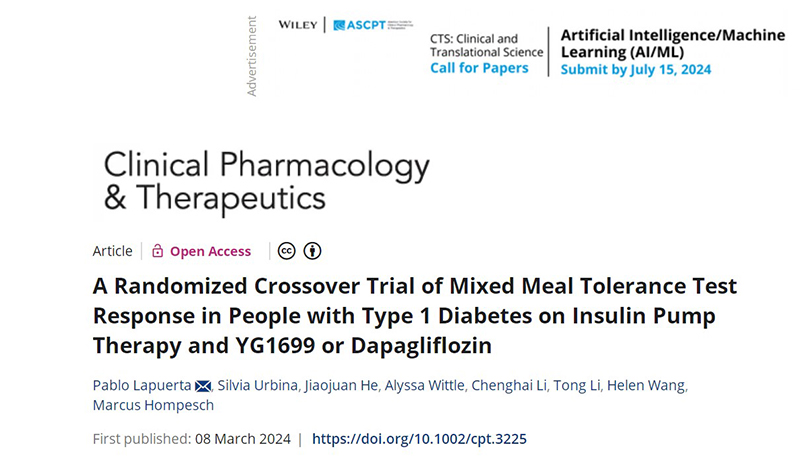Positive Results of a YG1699 Phase 2 Clinical Study Have Been Published by A Leading Medical Journal
2024-03-11 11:15:03Youngene Therapeutics recently announced that a results of a Phase 2 clinical study of its leading investigational product YG1699 have been accepted and officially published by the authoritative medical journal <Clinical Pharmacology & Therapeutics> VOLUME 115 | NUMBER 6 | June 2024 (http://dx.doi.org/10.1002/cpt.3225) in the United States.
The title of the paper is “A Randomized Crossover Trial of Mixed Meal Tolerance Test Response in People with Type 1 Diabetes on Insulin Pump Therapy and YG1699 or Dapagliflozin.” The study employed a randomized, double-blind, three-way crossover and active-control trial design, directly comparing YG1699 versus Dapagliflozin head-to-head in patients with type 1 diabetes. The results demonstrated that YG1699 significantly outperformed Dapagliflozin in postprandial blood glucose control, the primary endpoint of the study. The differences between YG1699 were clinically meaningful and robust, reflecting the dual mechanism of action of YG1699.
YG1699 is a dual inhibitor of SGLT1/SGLT2. It offers all the benefits of SGLT2 inhibition, while also providing SGLT1 inhibition to enhance efficacy. This study lays a solid foundation for further development of YG1699 as a differentiated product.
Youngene Therapeutics has presented multiple research findings on YG1699 at various international academic conferences for six consecutive years. Recently, new data have shown that YG1699 also can provide significant weight reduction, especially in reducing fat mass while preserving muscle mass. This discovery provides more possibilities for YG1699 in the treatment of obesity and related metabolic diseases.
Youngene Therapeutics is committed to providing safer and more effective treatment options for patients with chronic diseases such as diabetes, heart failure, kidney disease, and obesity. The publication of these findings not only demonstrates our innovative strength in pharmaceutical research and development but also brings new hope and treatment options to patients with chronic disease worldwide.
